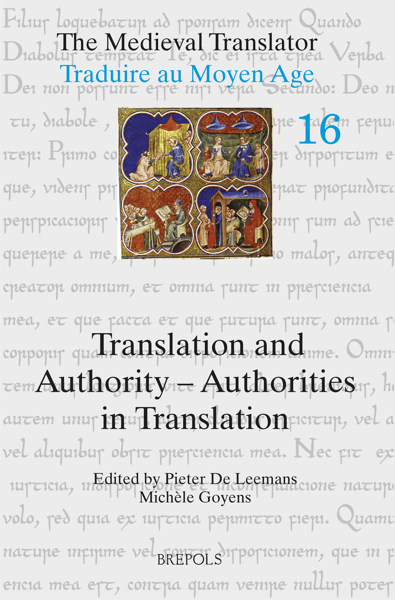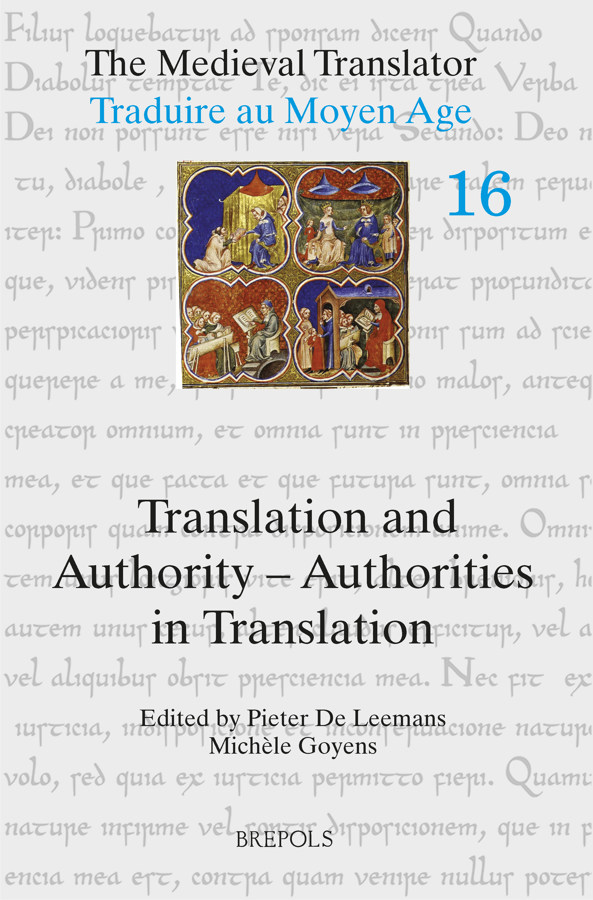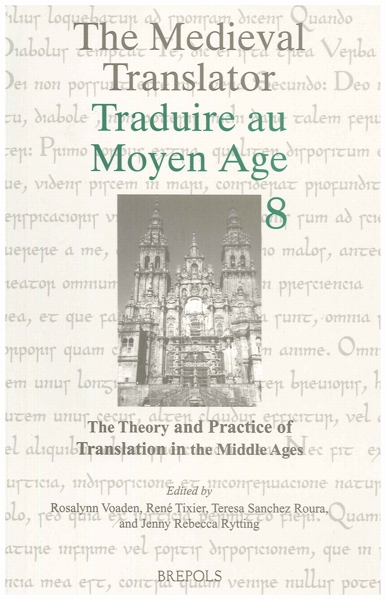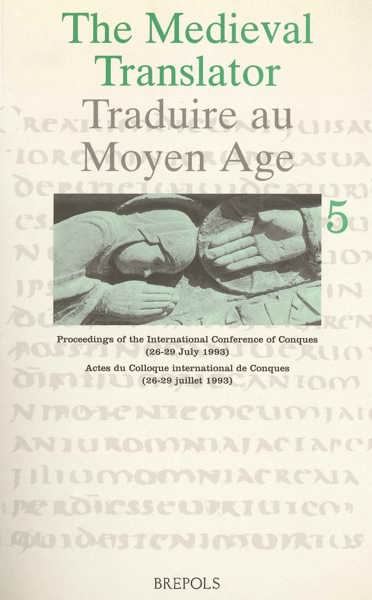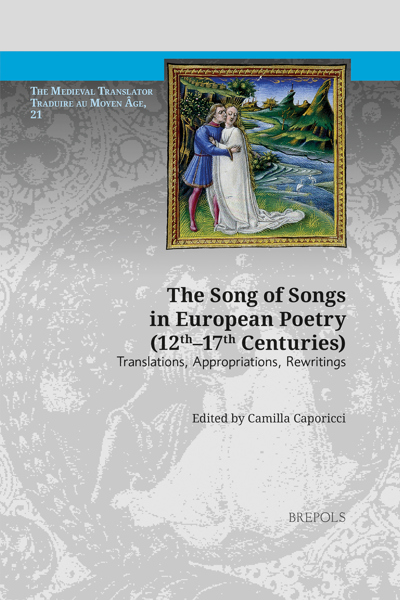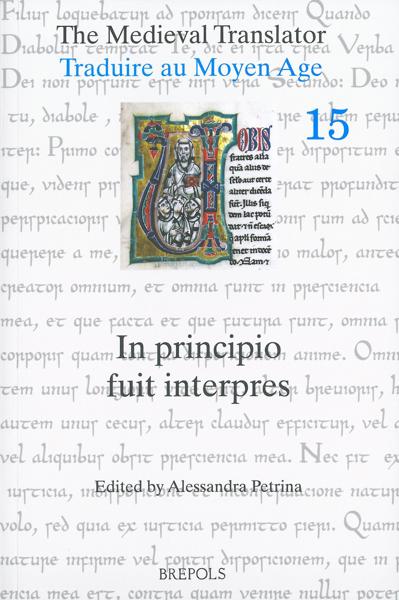
Translation and Authority - Authorities in Translation
Pieter De Leemans, Michèle Goyens (eds)
- Pages: 391 p.
- Size:156 x 234 mm
- Illustrations:7 b/w
- Language(s):English, French
- Publication Year:2017
- € 95,00 EXCL. VAT RETAIL PRICE
- ISBN: 978-2-503-56676-4
- Paperback
- Available
- € 95,00 EXCL. VAT RETAIL PRICE
- ISBN: 978-2-503-56711-2
- E-book
- Available
Medieval translation of authoritative texts and the way medieval translators deal with authoritative authors
« (…) nous pouvons saluer, en conclusion, la cohérence du volume, qui se fait remarquer également pour son ouverture. Grâce à la qualité des auteurs, l’ouvrage apporte des contributions importantes à l’étude du concept d’ « auctoritas » ainsi qu’à celle de la théorie et de la pratique de la traduction médiévale. » (Francesco Montorsi, dans Francia-Recensio, 4, 2017)
“Overall (...), it can be said that the book as a whole advances our appreciation for the complications generated by translation in the middle ages. Each article presents new insights on compelling topics and can provide a new look at how specific practices of producing, reading, or evaluating translations and translators can help us better understand medieval notions of authority. Scholars interested in translation, authority, and authorship would be well served in reading the chapters that are most relevant to their research.” (Katherine E.C. Willis, in The Medieval Review, 19.11.09)
Pieter De Leemans is Professor at the De Wulf-Mansion Centre for Ancient, Medieval, and Renaissance Philosophy of the University of Leuven, and academic secretary of the Aristoteles Latinus.
Michèle Goyens is Professor of French diachronic linguistics at the University of Leuven. Her research is focused on medieval translations and the development of the scientific vocabulary in the vernacular.
The question about the relation between medieval translation practices and authority is a complex and multifaceted one. Depending on one’s decision to focus on the authority of the source-text or of the translated text itself, on the author of the original text, on the translator, or on the user of the translation, it falls apart in several topics to be tackled, such as, just to name a few: To what extent does the authority of the text to be translated affect translational choices? How do translators impose authority on their text? By lending their name to a translation, do they contribute to its authoritative status?
After two introductory essays that set the scene for the volume, addressing the above questions from the perspective of translations of authoritative texts into Dutch and French, the focus of the volume shifts to the translators themselves as authorities. A next section deals with the choices of texts to be translated, and the impact these choices have on the translation method. A third part is dedicated to papers that examine the role of the users of the translations.
The selection of papers in the present volume gives a good indication of the issues mentioned above, embedded in a field of tension between translations made from a learned language to a vernacular language, translations from one vernacular to another, or even from a vernacular to the Latin language.
Acknowledgements
Translation and Authority – Authorities in Translation. Introduction
Pieter De Leemans - Michèle Goyens
Authority in Middle Dutch
Paul Wackers
Que traduire en français ? Traductions uniques et traductions multiples
Joëlle Ducos
The Translator as an Authority
Charles Burnett
The Form of Authority in Medieval Translation: Brunetto Latini’s Translations of Cicero
Michelle Bolduc
Langue de l’’aucteur’ et langue du ‘translateur’ ? Réflexions sur la langue de Nicolas de Gonesse
Graziella Pastore
Authority and the Translation of Boethian Selves: John Walton, James I, and Thomas Usk
Ian Johnson
The Un-Authoritative Translation: Ælfric’s Book of Genesis, and the Need for External Authority
Marcela K. Perett
Translating the Context in the Orrmulum
Sharon Rhodes
John of Trevisa légitimise la traduction en langue anglaise (vers 1387)
Juliette Dor
L'autorité et le développement d'une terminologie médicale aux XIVe et XVe siècles
Ildiko Van Tricht
Les traductions de l’Opus Agriculturae de Rutilius Aemilianus Palladius aux XIVe - XVe siècles et la création de néologismes
Moreno Campetella
Les traductions latines du livre de Marco Polo et l’autorité du texte
Christine Gadrat-Ouerfelli
The Middle English Translation of the ‘De Falconibus’ by Albertus Magnus in The Kerdeston Cynegetical Manuscripts
An Smets
‘Help thin Godric in Francrice: an Old French Life of St Godric’
Anne Mouron
À propos de la première traduction de l'Enfer de Dante: un modèle poétique?
Stefania Vignali
Mechtild of Hackeborn as Spiritual Authority: the Middle English Translation of the Liber Specialis Gratiae
Naoë Kukita Yoshikawa
The Re-Invention of Authority in the Fifteenth-Century Translations of Richard Rolle’s Emendatio Vitae
Tamás Karáth
Walter Hilton translateur d'auctoritates
Marthe Mensah – Claude Schwerzig
Interpretive Etymologies in Translations of the Golden Legend
Courtney Rydel
Translating Christian Symbolism into Old Norse Mythology in Thirteenth-Century Norway
Stefka E. Eriksen
Vulgate Versus Vetus Latina: The Choices of Caesarius of Arles
Igor Filippov
Augustine’s De Genesi Ad Litteram as a Commentary on the De Anima. A Significant Case of Comparison between Authority and Translations in the 13th Century
Andrea Colli
Chauntecleer’s Small Latin and the Meaning of Confusio in the Nun’s Priest’s Tale
Stefania d’Agata d’Ottavi
Aggressive Chaucer: of Dolls, Drink and Dante
Alastair Minnis
Index
